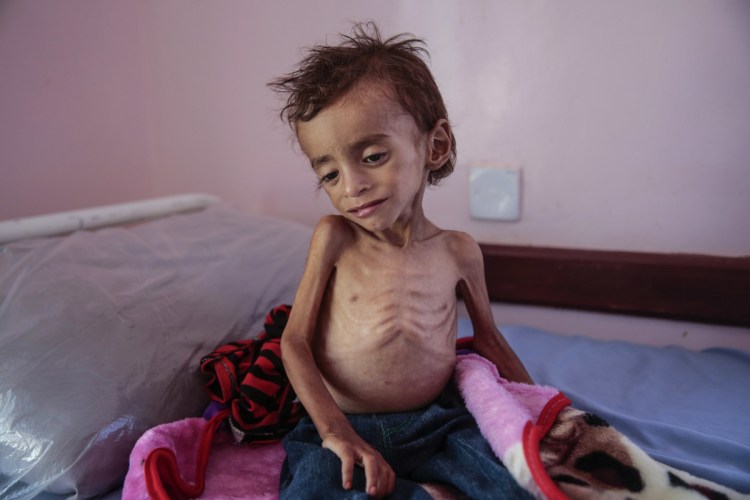WASHINGTON — One day after President Trump backed the Saudi crown prince over accusations that he may have ordered the killing of journalist Jamal Khashoggi, a leading charity has issued a blistering report that poses more uncomfortable questions over Saudi practices.
More than 85,000 children may have died from hunger since Saudi Arabia intervened in the war in Yemen three years ago, according to Save the Children, a British charity.
“For every child killed by bombs and bullets, dozens are starving to death and it’s entirely preventable,” said Tamer Kirolos, Save the Children’s country director in Yemen.
With only few hospitals still operational, the NGO says that the human toll of the conflict cannot be fully captured by simply relying on official numbers.
Instead, the charity used historical mortality rates and U.N. data on Yemeni malnutrition to estimate that more than 25,000, or 20 to 30 percent of all acutely malnourished children, have died every year since April 2015. The estimates, the NGO said, may still be lower than the actual number of deaths.
“Children who die in this way suffer immensely as their vital organ functions slow down and eventually stop. Their immune systems are so weak they are more prone to infections, with some too frail to even cry,” Save the Children representative Kirolos said.
“Parents are having to witness their children wasting away, unable to do anything about it,” he said.
According to the United Nations, half the Yemeni population suffers from famine.
The United States has long remained largely silent on the war, even when Saudi Arabia enacted a blockade on its borders with Yemen last November. Since then, human rights groups have struggled to supply some of the most malnourished areas in the country with food and drinking water. About 90 percent of the country is considered to be desert or arid and the Yemeni government heavily relied on food imports prior to the conflict.
What began as a rebellion by the country’s Shiite-majority Houthi rebels during the Arab Spring has turned into a bigger confrontation between Saudi Arabia and its archrival Iran, which supports the Houthis.
Saudi Arabia has received support from eight other Arab states that are also opposed to Iran’s influence. U.S. officials long argued that the involvement of Iran has made it impossible to end the conflict, but criticism of that assessment has mounted as the conflict became the world’s largest humanitarian crisis.
Western nations have remained careful in calibrating their responses, to neither disgruntle the wealthy and investment-eager Saudi leadership nor domestic human rights supporters too much. Germany, for instance, reduced its arms equipment sales to Saudi Arabia and vowed to stop them completely, but quietly approved new sales earlier this year. (Those sales have now been stopped amid the killing of Washington Post contributing columnist Khashoggi).
In the United States, Trump has put Saudi investments and arms purchases first, even as members of his administration have pressured the Saudis to stop the Yemeni conflict. Defense Secretary Jim Mattis and Secretary of State Mike Pompeo both vowed in October that the war should come to an end. The United States exports more arms to Saudi Arabia than any other country.
“It is time to end this conflict, replace conflict with compromise, and allow the Yemeni people to heal through peace and reconstruction,” Pompeo said.
Send questions/comments to the editors.



Success. Please wait for the page to reload. If the page does not reload within 5 seconds, please refresh the page.
Enter your email and password to access comments.
Hi, to comment on stories you must . This profile is in addition to your subscription and website login.
Already have a commenting profile? .
Invalid username/password.
Please check your email to confirm and complete your registration.
Only subscribers are eligible to post comments. Please subscribe or login first for digital access. Here’s why.
Use the form below to reset your password. When you've submitted your account email, we will send an email with a reset code.